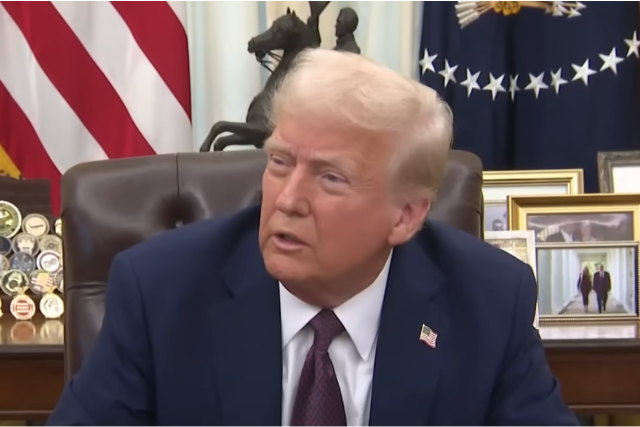News
Despite Trump’s Calls to Lower Interest Rates, the Federal Reserve Will Likely Raise Them Instead

Source: YouTube
President Donald Trump has renewed his call for the Federal Reserve to lower interest rates, but Wall Street and economists remain skeptical. Speaking at the World Economic Forum in Davos, Switzerland, Trump emphasized the need for immediate rate cuts, claiming he understands rates “better than the one who’s primarily in charge,” a clear jab at Fed Chair Jerome Powell. Despite Trump’s insistence, the Federal Reserve appears unlikely to comply, with analysts warning that rate hikes may even be on the horizon.
A Clash of Perspectives: Trump vs. the Fed
The president’s demands reflect his long-held belief that lower rates will stimulate economic growth and counterbalance the potential inflationary impact of his policies, including tariffs and immigration curbs. However, Fed officials have signaled caution. After a series of rate cuts last year, the current range of 4.25%–4.5% is expected to hold steady in the near term. Analysts argue that Trump’s aggressive stance could jeopardize the Fed’s independence, a cornerstone of its credibility.
Wall Street is bracing for a different scenario. Economists like Thanos Papasavvas of ABP Invest suggest the resilient U.S. economy and inflationary pressures may force the Fed to raise rates by the end of 2025. “The Fed will choose inflation control over employment,” he wrote, highlighting the central bank’s commitment to its inflation-fighting mandate.
Market Sentiment and Inflation Fears
The divide between Trump and the Fed stems largely from differing views on inflation. Trump argues that easing oil prices and steady economic growth justify immediate rate cuts. However, key economic indicators suggest otherwise. Rising wages, ongoing supply chain disruptions, and potential labor shortages due to immigration policies could keep inflation elevated.
Dan Ivascyn, CIO of Pimco, predicts the Fed will hold rates unchanged “for the foreseeable future” but acknowledges that recent consumer surveys reflect higher inflation expectations. Other experts, like Bank of America, believe the Fed’s rate-cutting cycle is over, with discussions now shifting toward potential hikes.
Trump Knows Interest Rates ‘Better Than They Do’
President Donald Trump has repeatedly clashed with Federal Reserve Chair Jerome Powell, whom he appointed in 2018, over interest rate policies. Trump has criticized Powell for being too cautious, often breaking with the tradition of respecting the Fed's independence. At the World Economic Forum, Trump reignited tensions, claiming, “I think I know interest rates much better than they do,” and directly referencing Powell, “I know it certainly much better than the one who's primarily in charge.”
Despite asserting he is “guided” by the Fed, Trump signaled he may intervene, saying, “At the right time, I would” meet Powell about lowering rates. Powell, however, has repeatedly emphasized the Fed’s independence and commitment to data-driven decisions.
Trump’s pressure risks undermining the Fed’s credibility, economists warn, potentially fueling market uncertainty. With Powell’s term ending in 2026, their growing divide raises concerns about the balance of power between politics and monetary policy.
Economic and Political Implications of Lower Interest Rates
Trump’s public push for lower rates could have significant consequences for both the economy and the political landscape. On one hand, rate cuts might stimulate short-term growth and bolster the president’s economic credentials. On the other, they could fuel inflation fears, leading to higher long-term rates and dampening economic stability.
Critics argue that Trump’s comments risk politicizing the Fed and undermining its independence. Francesco Bianchi, an economist at Johns Hopkins University, warns that such interference could erode market confidence and complicate the Fed’s ability to manage monetary policy effectively. Meanwhile, Powell has reiterated his intention to prioritize data-driven decisions over political influence, potentially setting the stage for a contentious relationship between the White House and the Fed.
Should the Federal Reserve lower interest rates in response to Trump’s demands? Tell us what you think!



